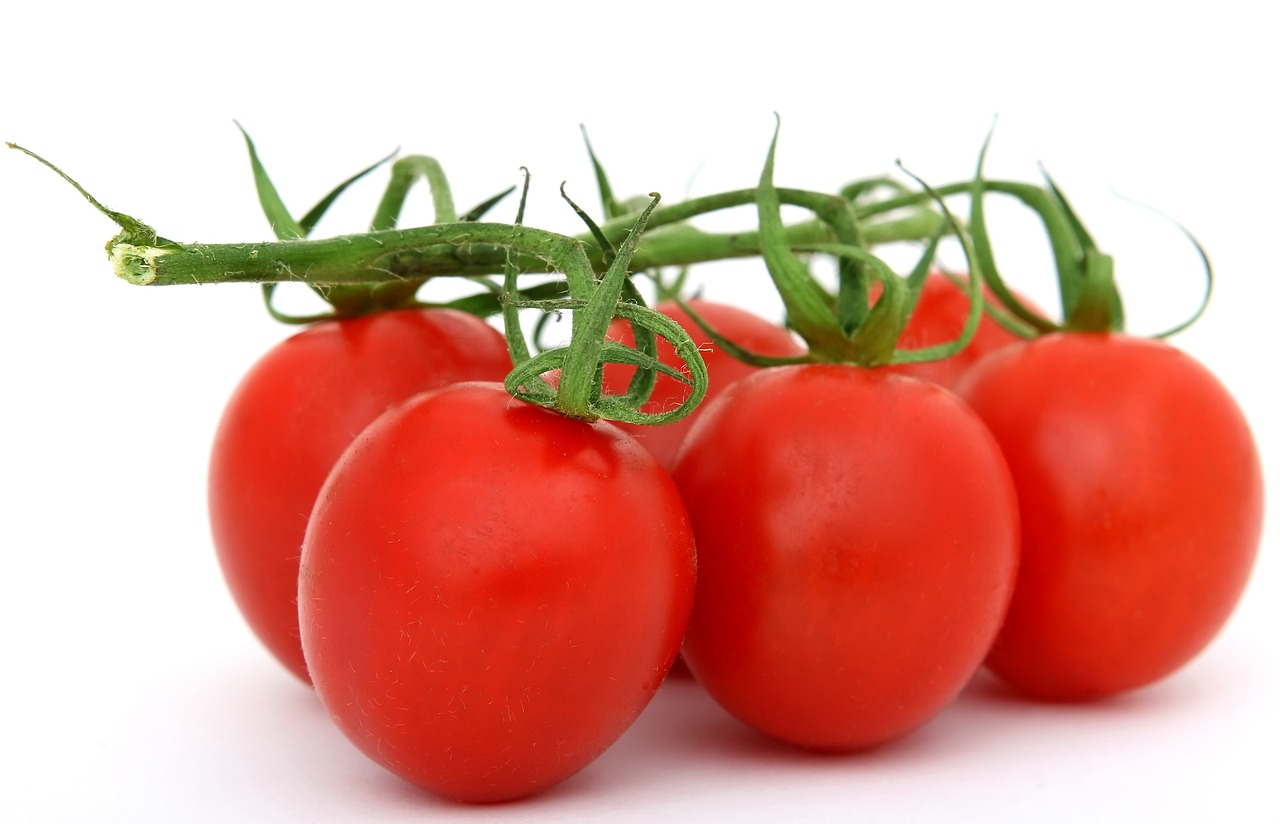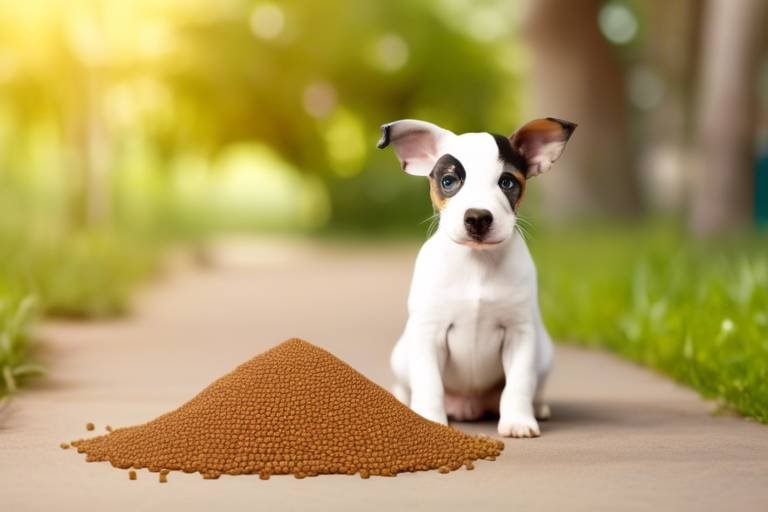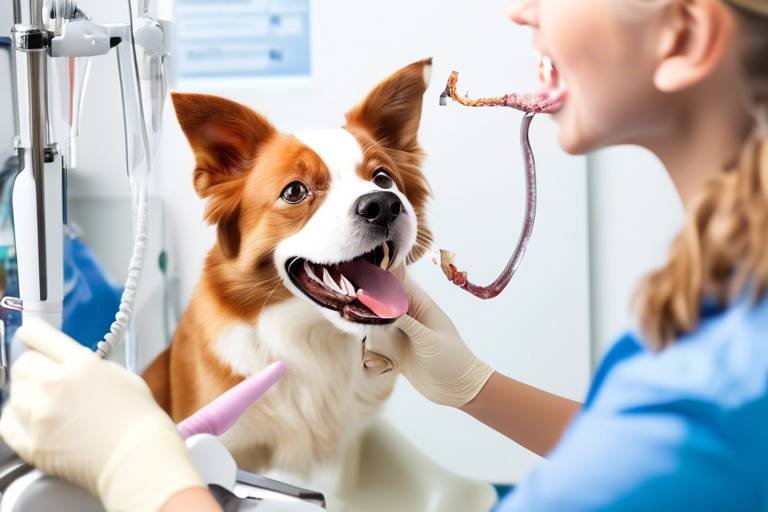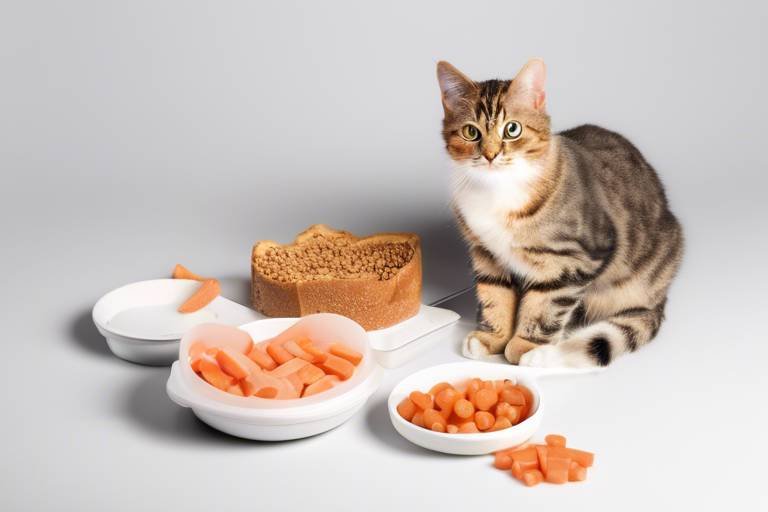The Importance of Phosphorus in Pet Diets
When it comes to ensuring our furry friends live their healthiest lives, nutrition plays a pivotal role, and one of the unsung heroes in pet diets is phosphorus. This essential mineral is not just a minor player; it’s crucial for a myriad of bodily functions that directly impact your pet's health, vitality, and overall well-being. You might be wondering, "What makes phosphorus so special?" Well, buckle up, because we’re about to dive into the fascinating world of phosphorus and its importance in your pet's diet.
Phosphorus is a vital component of many biological processes. It’s like the fuel that powers a car; without it, your pet’s body wouldn’t function properly. From energy production to bone health, phosphorus is involved in numerous critical activities. For instance, it helps in the formation of ATP (adenosine triphosphate), the energy currency of cells, which your pet relies on for everything from running and playing to simply breathing. Moreover, phosphorus works in harmony with calcium, another essential mineral, to maintain strong bones and teeth. Imagine phosphorus and calcium as a dynamic duo, akin to Batman and Robin, each relying on the other to keep your pet's skeletal structure robust and healthy.
But wait, there’s more! Phosphorus also plays a role in cellular repair and growth, making it essential for pets of all ages, especially growing puppies and kittens. When they’re developing, their bodies need a lot of this mineral to build strong cells and tissues. And let’s not forget about its role in maintaining a healthy metabolism. It’s safe to say that without sufficient phosphorus, your pet might feel sluggish and lackluster, which is the last thing we want for our playful companions.
So, how do we ensure that our pets are getting enough phosphorus? It starts with understanding the sources. Many pet foods are formulated to contain the right balance of phosphorus and other nutrients. However, it’s always a good idea to check the labels and consult with your veterinarian to ensure that your pet’s diet is on point. After all, just like we wouldn’t want to eat a diet lacking in essential nutrients, our pets deserve the same care and attention.
In summary, phosphorus is more than just a mineral; it’s a fundamental building block of your pet’s health. By understanding its importance and ensuring your pet receives adequate amounts through their diet, you can help them lead a vibrant and active life. So, keep an eye on those phosphorus levels, and let’s keep our pets healthy and happy!
- What are the signs of phosphorus deficiency in pets? Look for symptoms such as weakness, bone pain, and poor growth in young animals.
- Can pets get too much phosphorus? Yes, excessive phosphorus can lead to toxicity, affecting kidney function and overall health.
- What foods are high in phosphorus for pets? Foods like meat, fish, and certain grains are excellent sources of phosphorus.
- Should I supplement my pet's diet with phosphorus? Only if recommended by a veterinarian, as most commercial pet foods provide adequate amounts.

Understanding Phosphorus
Phosphorus is a vital mineral that plays an essential role in the overall health and well-being of our beloved pets. It is not just a mere ingredient in pet food; it is a powerhouse element that contributes to various bodily functions. From energy production to bone health, phosphorus is involved in numerous biochemical processes that keep our furry friends thriving. But what exactly does phosphorus do, and why is it so crucial for your pet's diet?
First off, phosphorus is a key player in the formation of ATP (adenosine triphosphate), which is the energy currency of the cell. Think of ATP as the fuel that powers your pet's daily activities, from chasing after a ball to simply wagging their tail. Without sufficient phosphorus, your pet may feel sluggish and lack the energy to engage in their favorite activities. This can lead to a less active lifestyle, which can affect their overall health.
Moreover, phosphorus is indispensable for maintaining strong bones and teeth. It works hand-in-hand with calcium, another vital mineral, to ensure that your pet's skeletal structure remains robust and healthy. Just as a sturdy foundation is essential for a house, a balanced ratio of phosphorus and calcium is crucial for your pet's bone integrity. An imbalance can lead to serious health issues, including weak bones and dental problems.
Phosphorus is also involved in cellular repair and growth. It helps in the formation of DNA and RNA, the building blocks of life. This means that phosphorus is not just important for energy and bone health; it is also critical for the growth and repair of tissues. In young pets, adequate phosphorus intake supports their rapid growth and development, while in older pets, it aids in healing and recovery.
Natural sources of phosphorus include:
- Meats (like chicken, beef, and fish)
- Dairy products (such as yogurt and cheese)
- Eggs
- Whole grains
- Legumes
These foods are not only rich in phosphorus but also provide other essential nutrients that contribute to your pet's overall health. It's important to note that while phosphorus is crucial, it should be consumed in the right amounts to avoid potential health risks.
In summary, phosphorus is a powerhouse mineral that supports energy production, bone health, and cellular repair in pets. Understanding its significance can help pet owners make informed dietary choices that promote their pet's health and vitality. Keep an eye out for phosphorus levels in your pet's diet, and remember that a balanced approach is key to ensuring your furry friend leads a happy and active life.

Role of Phosphorus in Bone Health
When it comes to keeping your furry friends healthy, phosphorus is a rock star, especially in the realm of bone health. This essential mineral works hand-in-hand with calcium to build and maintain strong bones and teeth. Think of phosphorus as the glue that holds everything together—without it, your pet's skeletal structure could become weak and brittle, much like a house built without a solid foundation.
Phosphorus is crucial for the formation of hydroxyapatite, the mineral complex that gives bones their strength and rigidity. In fact, about 85% of the phosphorus in your pet's body is found in the bones! It’s fascinating to realize how intertwined these minerals are; calcium and phosphorus need to be in balance to ensure optimal health. If one is lacking, it can lead to serious consequences for your pet's skeletal integrity.
But what happens if your pet doesn't get enough phosphorus? Just like a car that runs out of gas, your pet can experience a range of issues. A deficiency can lead to conditions like rickets in young animals, which causes soft and deformed bones. Older pets may suffer from osteomalacia, where bones become weak and painful. It's essential to monitor your pet's diet to prevent these issues.
To help you understand the importance of phosphorus in your pet's bone health, here’s a quick breakdown of its functions:
| Function | Description |
|---|---|
| Bone Formation | Phosphorus combines with calcium to form hydroxyapatite, essential for strong bones. |
| Cellular Repair | It aids in the repair and growth of bone cells, ensuring healthy bone density. |
| Energy Transfer | Phosphorus is vital for ATP production, which powers cellular functions, including those in bones. |
It's also important to note that while phosphorus is essential, it must be consumed in the right amounts. Too much phosphorus can lead to imbalances that may cause health issues, particularly in pets with kidney problems. This is why understanding your pet's specific needs is crucial.
In conclusion, phosphorus plays a pivotal role in maintaining your pet's bone health. By ensuring they receive sufficient amounts through a balanced diet, you can help them lead a vibrant, active life. Always keep an eye on their dietary intake, and consult your veterinarian if you have any concerns about their phosphorus levels.
Phosphorus and Energy Metabolism
Phosphorus is not just a mineral; it's a powerhouse when it comes to your pet's energy metabolism. Think of phosphorus as the fuel that ignites the engine of cellular activity. It plays a pivotal role in the formation of adenosine triphosphate (ATP), which is often referred to as the "energy currency" of the cell. Without adequate phosphorus, your pet's cells struggle to produce ATP, leading to fatigue and decreased vitality. Just like a car needs gasoline to run smoothly, your furry friend needs phosphorus to keep their energy levels high and their bodies functioning optimally.
When your pet consumes food, phosphorus works in tandem with other nutrients to convert the food into usable energy. This process is essential for everything from daily activities like running and playing to critical bodily functions such as digestion and respiration. Imagine your pet trying to sprint at the park but feeling sluggish instead; that could be a sign of phosphorus deficiency affecting their energy levels.
Moreover, phosphorus is involved in the synthesis of nucleic acids and phospholipids, which are crucial for cell membrane integrity and function. These components are vital for the growth and repair of tissues, ensuring that your pet remains active and healthy. In essence, phosphorus is the unsung hero of energy metabolism, working behind the scenes to ensure that your pet has the stamina to enjoy life to the fullest.
To illustrate the importance of phosphorus in energy metabolism, consider this simple analogy: if your pet's body is a factory, phosphorus is one of the key ingredients that keeps the production line running efficiently. Without it, the entire operation can slow down, leading to a cascade of health issues. Therefore, ensuring your pet gets enough phosphorus through their diet is crucial for maintaining their energy levels and overall well-being.
In summary, phosphorus is integral to energy metabolism in pets. It not only aids in ATP production but also supports various cellular functions that are essential for maintaining high energy levels. As pet owners, it's essential to monitor your pet's phosphorus intake to keep their energy soaring and their spirits high.
- What are the symptoms of phosphorus deficiency in pets? Symptoms can include lethargy, weakness, and poor appetite.
- Can I give my pet phosphorus supplements? Yes, but it's crucial to consult with a veterinarian before starting any supplementation.
- How much phosphorus does my pet need? The required amount varies by species and age, so it's best to discuss this with your veterinarian.
- Are there any risks associated with too much phosphorus? Yes, excessive phosphorus can lead to toxicity, affecting kidney function and overall health.
Signs of Phosphorus Deficiency
As a responsible pet owner, it's crucial to be aware of the in your furry friend. Phosphorus is a key player in maintaining overall health, and a lack of it can lead to a variety of health issues. So, how can you tell if your pet isn't getting enough of this essential mineral? Well, there are several symptoms to watch out for that can serve as red flags.
One of the most noticeable signs is a decrease in energy levels. If your pet seems unusually lethargic, it might be their body signaling that it’s not getting enough phosphorus to support energy production. Think of phosphorus as the fuel that powers your pet's daily activities; without it, they may struggle to keep up with their usual playful antics.
Another common symptom is bone and dental issues. Phosphorus works hand-in-hand with calcium to build and maintain strong bones and teeth. If you notice your pet has developed a tendency to limp, or if their teeth appear weak or decayed, it could be a sign that they are lacking phosphorus. Just like how a house needs a solid foundation to stand tall, your pet’s bones need adequate phosphorus to remain strong.
Digestive problems can also arise due to phosphorus deficiency. Pets may experience loss of appetite or gastrointestinal disturbances, which can lead to weight loss and further health complications. If your pet is turning their nose up at their food bowl or seems to be having trouble digesting their meals, it’s time to take a closer look at their phosphorus intake.
In some cases, you might even observe muscle weakness or twitching. Phosphorus plays a vital role in muscle function, and insufficient levels can lead to discomfort or spasms. Imagine trying to run a marathon without enough energy—your muscles would protest, and so will your pet’s.
To help you identify these symptoms more effectively, here’s a quick summary of the signs of phosphorus deficiency:
- Decreased energy levels
- Bone and dental issues
- Loss of appetite
- Digestive problems
- Muscle weakness or twitching
If you notice any of these signs in your pet, it’s essential to consult with a veterinarian as soon as possible. They can conduct tests to determine phosphorus levels and recommend dietary changes or supplements if necessary. Remember, early detection is key to preventing serious health issues down the line.
Q: What are the long-term effects of phosphorus deficiency in pets?
A: Long-term phosphorus deficiency can lead to severe bone disorders, weakened immune function, and overall poor health. It's vital to ensure your pet's diet is balanced and contains adequate phosphorus.
Q: Can I give my pet phosphorus supplements without consulting a vet?
A: It’s not recommended. Always consult with a veterinarian before adding any supplements to your pet's diet to avoid potential toxicity or imbalances.
Q: Are there specific pet foods that are higher in phosphorus?
A: Yes, many high-quality pet foods are formulated with adequate phosphorus levels. Look for those that list meat or fish as the primary ingredient, as these are typically rich in phosphorus.
Q: How can I ensure my pet is getting enough phosphorus?
A: Providing a balanced diet that includes natural sources of phosphorus, such as meat, fish, and dairy, is essential. Regular vet check-ups can also help monitor your pet’s nutritional needs.
Phosphorus Toxicity in Pets
While phosphorus is undeniably essential for your pet's health, it's important to recognize that too much of a good thing can lead to serious issues. Just like how a well-balanced diet is crucial for humans, pets also require the right amounts of nutrients, including phosphorus. When phosphorus levels exceed what is necessary, it can lead to a condition known as phosphorus toxicity.
Phosphorus toxicity can occur due to excessive supplementation or consumption of phosphorus-rich foods, particularly in pets with underlying health issues such as kidney disease. In healthy pets, the kidneys efficiently regulate phosphorus levels, but in those with compromised kidney function, the body may struggle to excrete excess phosphorus, leading to elevated levels in the bloodstream.
So, what are the symptoms of phosphorus toxicity? Recognizing the signs early can be a lifesaver for your furry friend. Common symptoms include:
- Loss of Appetite: Pets may refuse to eat or show a decreased interest in food.
- Vomiting: Frequent vomiting can occur as the body attempts to rid itself of the excess phosphorus.
- Weakness and Lethargy: A noticeable drop in energy levels can indicate underlying health issues.
- Increased Thirst and Urination: Pets may drink more water and urinate more frequently as their bodies try to manage phosphorus levels.
If you notice any of these symptoms, it's crucial to consult a veterinarian immediately. They can perform blood tests to check phosphorus levels and determine the best course of action. Treatment may involve adjusting your pet's diet, reducing phosphorus intake, or providing medications to help manage the condition.
In conclusion, while phosphorus is a vital nutrient for your pet, moderation is key. Keeping a close eye on your pet's diet and being aware of the signs of phosphorus toxicity can help ensure they remain healthy and happy. Remember, a little knowledge goes a long way in keeping your furry family members safe!
1. What are the signs of phosphorus toxicity in pets?
Common signs include loss of appetite, vomiting, weakness, increased thirst, and frequent urination.
2. Can phosphorus toxicity be treated?
Yes, treatment typically involves dietary changes and possibly medications to help manage phosphorus levels.
3. How can I ensure my pet gets the right amount of phosphorus?
Consulting with a veterinarian is the best way to determine your pet's specific dietary needs, including phosphorus intake.
4. Are some pets more at risk for phosphorus toxicity?
Yes, pets with kidney disease or those receiving excessive supplementation are at a higher risk.
Dietary Sources of Phosphorus
When it comes to ensuring that our furry friends receive the right amount of phosphorus, understanding the dietary sources is key. Phosphorus is found in a variety of foods, and incorporating these into your pet's diet can significantly enhance their overall health. Some of the richest sources of phosphorus include meats, fish, and certain grains. For example, organ meats like liver are particularly high in phosphorus, making them an excellent choice for pets that enjoy a protein-rich diet.
Additionally, fish such as salmon and sardines not only provide phosphorus but also offer omega-3 fatty acids, which are beneficial for skin and coat health. If your pet is a fan of seafood, these options can be a delicious way to boost their phosphorus intake. Furthermore, dairy products like yogurt and cheese are also rich in phosphorus, although these should be given in moderation, especially for pets that might be lactose intolerant.
For those pet owners who prefer a plant-based diet for their pets, there are still plenty of options available. Whole grains, nuts, and legumes can also be good sources of phosphorus. For instance, quinoa and lentils are not only nutritious but also packed with this essential mineral. However, it’s important to remember that animal-based sources are generally more bioavailable, meaning pets can absorb the phosphorus more effectively from these foods.
Here’s a quick overview of some common dietary sources of phosphorus:
| Food Source | Phosphorus Content (mg per 100g) |
|---|---|
| Liver (beef) | 500 |
| Salmon | 300 |
| Chicken | 220 |
| Quinoa | 150 |
| Lentils | 180 |
| Cheese | 500 |
Ultimately, ensuring your pet gets enough phosphorus is about balance. A diet that includes a variety of these sources can help maintain optimal health. However, it’s crucial to consult with a veterinarian to tailor your pet's diet to their specific needs. This way, you can ensure they are receiving not just phosphorus, but all the essential nutrients required for a happy and healthy life.
- Can pets have too much phosphorus? Yes, excessive phosphorus can lead to health issues, particularly in pets with kidney problems.
- How do I know if my pet is getting enough phosphorus? Monitoring their diet and consulting with a veterinarian can help determine if they are receiving adequate phosphorus.
- Are there vegetarian sources of phosphorus for pets? Yes, quinoa, lentils, and certain nuts are good vegetarian sources of phosphorus.

Supplementing Phosphorus in Pet Diets
When it comes to ensuring our furry friends receive the proper nutrition, phosphorus supplementation can sometimes be a hot topic. Just like humans, pets can have varying dietary needs based on their age, health status, and lifestyle. For some pets, particularly those with specific health conditions or dietary restrictions, supplementing phosphorus may be necessary to maintain optimal health. But how do you know if your pet needs it? And if so, what are the best ways to incorporate it into their diet?
First off, it’s essential to understand that not all pets will require phosphorus supplements. For instance, younger pets, like puppies and kittens, typically get enough phosphorus from their balanced commercial diets. However, older pets, especially those with kidney issues, may need careful management of their phosphorus levels. Too little phosphorus can lead to bone health issues, while too much can exacerbate kidney problems. It’s a delicate balance!
So, when should you consider supplementing phosphorus? Here are a few scenarios:
- If your pet is on a homemade diet that may be lacking in essential nutrients.
- Pets with certain medical conditions, such as kidney disease, may require adjustments to their phosphorus intake.
- Older pets may benefit from phosphorus supplements to support bone health.
If supplementation is deemed necessary, there are various types of phosphorus supplements available on the market. These can range from powders to chews, making it easier to find a form that your pet will accept. However, it's crucial to choose high-quality supplements that are specifically formulated for pets. Always read the labels and consult with your veterinarian to ensure you're selecting the right product for your pet's needs.
Administering phosphorus supplements can be straightforward, but it’s vital to follow the recommended dosages. Over-supplementation can lead to toxicity, which can cause serious health issues. Common symptoms of phosphorus toxicity may include:
- Vomiting
- Diarrhea
- Loss of appetite
- Increased thirst and urination
To avoid these risks, always start with small doses and monitor your pet's response closely. If you notice any adverse effects, contact your veterinarian immediately. Remember, your vet is your best ally in navigating your pet’s nutritional needs.
In conclusion, while phosphorus is a crucial component of your pet's diet, supplementation should be approached with caution and professional guidance. It’s all about balance, and with the right information and support, you can help ensure your pet stays healthy and happy!
Q: How can I tell if my pet needs phosphorus supplements?
A: The best way to determine if your pet needs phosphorus supplements is to consult with your veterinarian. They can assess your pet's diet and health status to make tailored recommendations.
Q: Are there natural sources of phosphorus I can include in my pet's diet?
A: Yes! Foods like meat, fish, eggs, and dairy products are rich in phosphorus. If your pet is on a balanced commercial diet, they likely receive adequate phosphorus from these sources.
Q: What are the risks of phosphorus toxicity?
A: Phosphorus toxicity can lead to serious health issues, including kidney problems and digestive disturbances. Always follow dosing instructions and consult your vet if unsure.
Consulting with a Veterinarian
When it comes to managing your pet's diet, especially regarding essential nutrients like phosphorus, consulting with a veterinarian is not just a good idea—it's crucial! Think of your vet as your pet's personal nutrition coach, equipped with the knowledge and expertise to tailor dietary recommendations to your furry friend's unique needs. Just like humans, every pet is different, and their nutritional requirements can vary based on factors such as age, breed, activity level, and existing health conditions.
Veterinarians can perform comprehensive evaluations and recommend specific dietary adjustments to ensure your pet receives the right balance of phosphorus. They can help you understand whether your pet's current diet meets their phosphorus needs or if adjustments are necessary. In some cases, pets with certain health issues, such as kidney disease, may require a lower phosphorus intake, while others may need additional phosphorus to support their growth and energy levels.
Additionally, your vet can guide you through the various types of phosphorus supplements available on the market. Not all supplements are created equal, and some may be more suitable for your pet than others. Your veterinarian can help you navigate these options, ensuring you choose a product that is safe and effective for your pet's specific health profile.
Furthermore, regular check-ups with your vet can help monitor your pet's overall health and nutritional status. During these visits, you can discuss any concerns you may have about your pet's diet, including signs of deficiency or excess phosphorus intake. Remember, proactive care is always better than reactive care. By staying in touch with your veterinarian, you can help your pet maintain optimal health and vitality.
So, the next time you're considering a change in your pet's diet or are unsure about their phosphorus levels, don’t hesitate to reach out to your veterinarian. After all, they are your best resource for ensuring your beloved pet thrives!
- What are the signs of phosphorus deficiency in pets? Common signs include weakness, bone pain, and poor growth in young animals.
- Can I give my pet phosphorus supplements without consulting a vet? It's not advisable; always consult your vet before adding supplements to your pet's diet.
- What foods are high in phosphorus for pets? Foods like fish, meat, and certain grains are excellent sources of phosphorus.
- How can I tell if my pet is getting too much phosphorus? Symptoms of phosphorus toxicity can include lethargy, vomiting, and diarrhea.
Frequently Asked Questions
- What is the role of phosphorus in my pet's diet?
Phosphorus is essential for numerous bodily functions in pets, including energy production, bone health, and cellular repair. It works hand in hand with calcium to maintain strong bones and teeth, ensuring your furry friend stays healthy and active.
- How can I tell if my pet is deficient in phosphorus?
Signs of phosphorus deficiency can include weakness, lethargy, poor appetite, and dental issues. If you notice any of these symptoms, it’s crucial to consult your veterinarian for proper diagnosis and treatment options.
- Can my pet have too much phosphorus?
Yes, while phosphorus is vital, excessive amounts can lead to toxicity. Symptoms of phosphorus toxicity may include vomiting, diarrhea, and lethargy. It's important to maintain a balanced diet to avoid these risks.
- What are some natural sources of phosphorus for pets?
Natural food sources rich in phosphorus include meat, fish, eggs, and dairy products. Incorporating these into your pet's diet can help ensure they receive adequate phosphorus for optimal health.
- When should I consider phosphorus supplementation for my pet?
Supplementation may be necessary for pets with specific health conditions or dietary restrictions that prevent them from getting enough phosphorus. Always consult with your veterinarian before starting any supplements to ensure safety and effectiveness.
- How can I safely introduce phosphorus supplements into my pet's diet?
When introducing phosphorus supplements, start with a small dose and gradually increase it as recommended by your veterinarian. This approach helps monitor your pet's response and minimizes the risk of adverse effects.
- Why is it important to consult a veterinarian about my pet's phosphorus levels?
Veterinarians can provide tailored advice based on your pet's health, age, and dietary needs. They can help you determine the right phosphorus levels and suggest appropriate dietary changes or supplements if necessary.



















